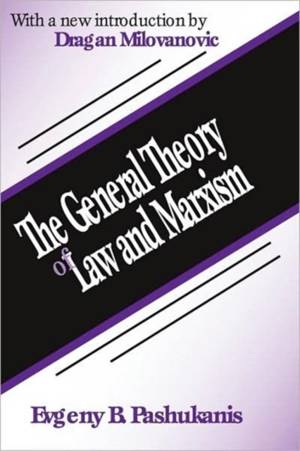
Vous voulez être sûr que vos cadeaux seront sous le sapin de Noël à temps? Nos magasins vous accueillent à bras ouverts. La plupart de nos magasins sont ouverts également les dimanches, vous pouvez vérifier les heures d'ouvertures sur notre site.
- Retrait gratuit dans votre magasin Club
- 7.000.000 titres dans notre catalogue
- Payer en toute sécurité
- Toujours un magasin près de chez vous
Vous voulez être sûr que vos cadeaux seront sous le sapin de Noël à temps? Nos magasins vous accueillent à bras ouverts. La plupart de nos magasins sont ouverts également les dimanches, vous pouvez vérifier les heures d'ouvertures sur notre site.
- Retrait gratuit dans votre magasin Club
- 7.000.0000 titres dans notre catalogue
- Payer en toute sécurité
- Toujours un magasin près de chez vous
62,45 €
+ 124 points
Format
Description
E. B. Pashukanis was the most significant contemporary to develop a fresh, new Marxist perspective in post-revolutionary Russia. In 1924 he wrote what is probably his most influential work, The General Theory of Law and Marxism. In the second edition, 1926, he stated that this work was not to be seen as a final product but more for "self-clarification" in hopes of adding "stimulus and material for further discussion." A third edition was printed in 1927.Pashukanis's "commodity-exchange" theory of law spearheaded a perspective that traced the form of law, not to class interests, but to capital logic itself. Until his death, he continued to argue for the ideal of the withering away of the state, law, and the juridic subject. He eventually arrived at a position contrary to Stalin's who, at that time, was attempting to consolidate and strengthen the state apparatus under the name of the dictatorship of the proletariat. Inevitably, Pashukanis was branded an enemy of the revolution in January 1937. His works were subsequently removed from soviet libraries. In 1954, Pashukanis was "rehabilitated" by the Soviets and restored to an acceptable position in the historical development of marxist law.In Europe and North America, a number of legal theorists only rediscovered Pashukanis's work in the late 1970s. They subjected it to careful critical analysis, and realized that he offered an alternative to the traditional Marxist interpretations, which saw law simply and purely as tied to class interests of domination. By the mid-1980s the instrumental Marxist perspective in vogue in Marxist sociology, criminology, politics, and economics gave way, to a significant extent due to Pashukanis's insights, to a more structural Marxist accounting of the relationship of law to economics and other social spheres.In his new introduction, Dragan Milovanovic discusses the life of Pashukanis, Marx and the commodity-exchange theory of law, and the historical lessons of Pashukanis's work. This book will be of interest to sociologists, criminologists, and political scientists interested in issues of law and Marxism.
Spécifications
Parties prenantes
- Auteur(s) :
- Editeur:
Contenu
- Nombre de pages :
- 218
- Langue:
- Anglais
- Collection :
Caractéristiques
- EAN:
- 9780765807441
- Date de parution :
- 15-10-01
- Format:
- Livre broché
- Format numérique:
- Trade paperback (VS)
- Dimensions :
- 151 mm x 226 mm
- Poids :
- 331 g







